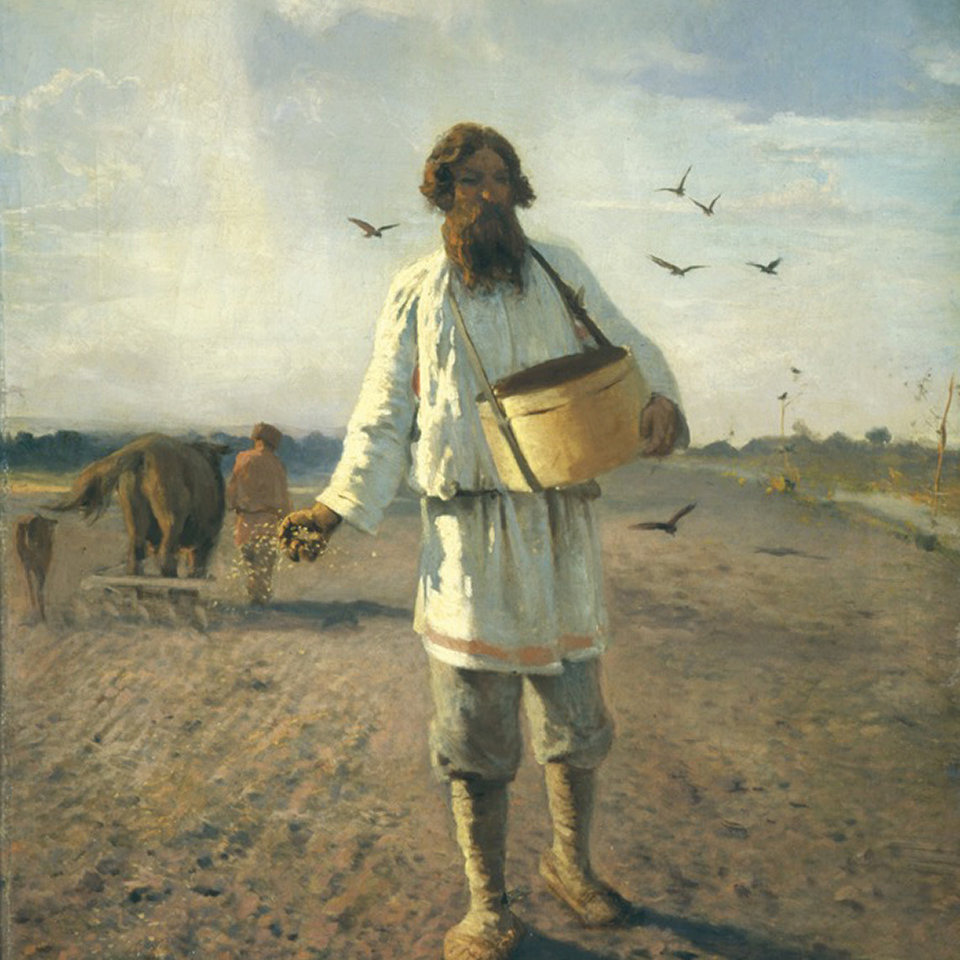The parable of the sower is part of a collection of stories told by Jesus that form (at least structurally) the centerpiece of St. Matthew’s Gospel. Together they address the central theme of the Matthean Gospel: the kingdom of heaven. For if we want to enter God’s kingdom, we must allow our souls to become receptive, fertile grounds for the seeds of divine grace.
The existence of a kingdom entails the existence of a king. So, if we hear news of a kingdom, we want to know who occupies the throne. “Kingdom of Heaven means, in fact, lordship of God,” writes Pope Benedict XVI, “and this means that his will must be adopted as the guiding criterion of our existence.”
In his highly celebrated Jesus of Nazareth trilogy, Pope Benedict goes into even more depth on a similar phrase used by Jesus—the kingdom of God. This latter term, preferred by Mark and Luke, is synonymous with the former. From the Christological perspective, writes Pope Benedict:
The Kingdom is not a thing, it is not a geographical dominion like worldly kingdoms. It is a person; it is he. On this interpretation, the term “Kingdom of God” is itself a veiled Christology. By the way in which he speaks of the Kingdom of God, Jesus leads men to realize the overwhelming fact that in him God himself is present among them, that he is God’s presence.
Yet the notion goes deeper still. There is a dimension wherein the kingdom of God resides in the heart of the Christian, a notion propounded by Origen in the early Church, and there is an ecclesiastical meaning of the kingdom of God—perhaps the most obvious sense of the term—whereby it represents the Church established by Christ!
But if there is one solitary take-home point in all of this, it is that the God revealed in Jesus Christ is King. We must, then, adopt the Marian attitude of attentiveness and obedience, and do whatever he tells us (John 2:5).
That God’s will must instruct our every move seems obviously correct in theory, but anyone who has attempted to unreservedly do God’s will in practice knows it is a very tall order. Indeed, often simply hearing God’s will can be difficult enough. Too often, we are resistant to the cultivation necessary for making us “good soil,” that the kernels of divine grace sown within us would take root and flourish.
Now, we all know that a parable by definition is a fictional story meant to teach a lesson. Interestingly, however, Pope Benedict contends that in a certain way the parable of the sower is autobiographical: “[Jesus] identifies himself with the sower who scatters the good seed of the Word of God and notes the different effects it obtains, in accordance with the way in which people hear the proclamation.”
Humans in their fallen nature have a strange propensity to resist God’s grace. We know this firsthand. It’s an idea that novelist Flannery O’Connor explored to great depths in her short stories and novels. “All human nature vigorously resists grace because grace changes us and the change is painful,” she observes. To shake us out of our complacence and wake us up to what God is trying to do in our lives, then, she has written stories that portray “the offer of grace, usually refused.”
And obviously, such human resistance will have implications for evangelization. We all know the challenge of proclaiming Christ to a culture that is largely disinterested in our message. Yet we also know that we too can be the ones who hear but do not understand. We too—though we are professing Christians—can be the ones who understand God’s words but do not allow it to anchor its roots deeply in our souls.
We know we are not perfect hearers. More to the point, we recognize we are not perfect doers. But neither were the saints. Remember St. Paul who writes, “I do not understand my own actions. For I do not do what I want, but I do the very thing I hate” (Rom. 7:15). We might be scandalized by such an admission from a great saint like Paul. We shouldn’t be. The way of the saint is not easy—not even for the saints. But it is the best way. “The terrible thing, the almost impossible thing, is to hand over your whole self—all your wishes and precautions—to Christ,” writes C.S. Lewis. “But it is far easier than what we are all trying to do instead.”
It’s important to face the gritty reality of our imperfect lives. Nonetheless, we must never give in to despair, for we have been called to “run with perseverance the race that is set before us, looking to Jesus the pioneer and perfecter of our faith, who for the sake of the joy that was set before him endured the cross” (Heb. 12:1-2).
May the seeds of truth, hope, and perseverance take root in our minds and hearts.
